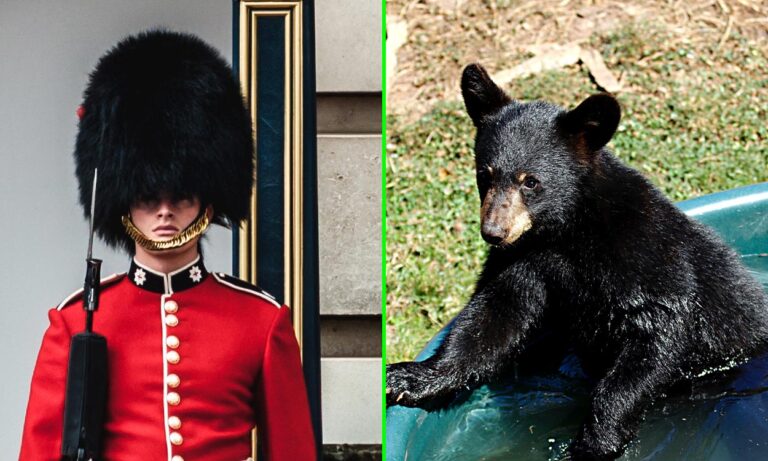Over 100 bears are killed every year to make the iconic King’s Guard hats
If you’ve ever embarked on a trip to Buckingham Palace or the Tower of London, you’ve probably taken a look at—or a picture of—the famous King’s Guard. Sporting a flash red infantry uniform, incredibly tall black fuzzy hat, and surrounded by eager tourists, this group is hard to miss. What some of you might not know, is that the Marge Simpson-esque hats in question are in fact made from the skin of black Canadian bears.
According to LADbible, each year, the British army imports up to 100 bearskins to create these highly water-resistant ceremonial hats. And despite numerous iconic designers, such as Stella McCartney, offering to create a sustainable and cruelty-free alternative—no such move has been made.
A spokesperson for the Ministry of Defence has stated, that “any attempt to substitute the hats leads to ‘unacceptable rates of water shedding’ onto the heads of the soldiers.”
The hats themselves, often referred to by the Army as ‘caps’, were first worn by British soldiers in 1815, following the Battle of Waterloo. The standard hat comes in at a whopping 18 inches although, according to British Heritage, it weighs a mere 1.5 pounds. So, if you were ever worried about the poor guards having to hold a mammoth hefty weight upon their head, fear not.
There has been an ongoing debate about this issue. In July 2022, Parliament discussed the topic and in an official statement, the Minister of State Defence Procurement Jeremy Quinn concluded that: “Our analysis of recent tests conducted on a fake fur fabric commissioned by PETA, showed it met one of the five requirements to be considered as a viable alternative for ceremonial caps.”
“Whilst it met the basic standard for water absorption, it showed unacceptable rates of water shedding and performed poorly on the visual assessment. As the man-made fur sadly didn’t meet the standards required for a ceremonial cap which is worn throughout the year and in all weathers, the Ministry of Defence has no plans to take this man-made fabric forward.”
Rather regrettably, the Canadian black bear is also in the “Not at Risk” category. The Fur Institute of Canada has reported that approximately 500,000 black bears inhabit forest areas in Canada and have thrived, adapting to a low level of human interaction. This story just keeps getting sadder.
It seems pretty definite that, at least for the foreseeable future, our friendly bear-neighbours from the North will continue to hold the unfortunate position of ‘The King’s Guard Official hat makers’.






